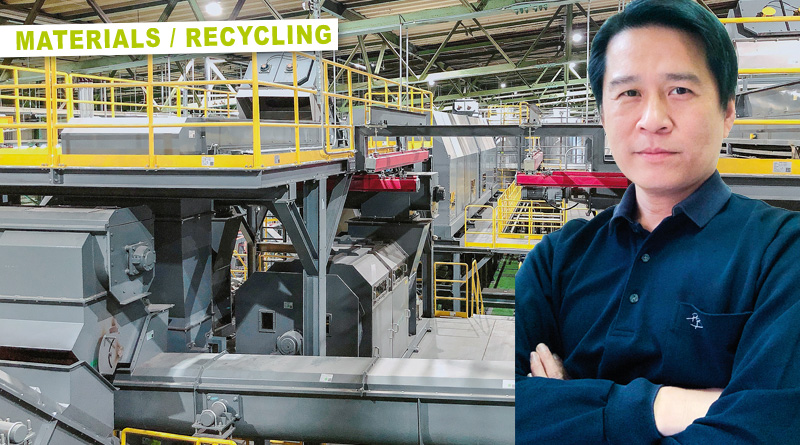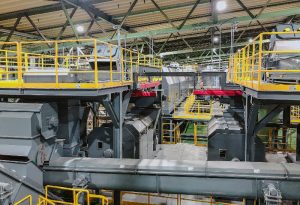Washing lines for Japan
Interview with Boretech Environmental Engineering Co., Ltd.
The Chinese recycling system supplier Boretech has massively expanded its influence in the Japanese market and plans to have installed a total of nine complete systems and various individual components by the end of 2022. The focus here lies on PET bottle washing systems for bottle-to-bottle recycling with a processing capacity of 6 t/h. Along with India, this makes Japan a key sales market and could, according to the company, increase the proportion of sales from 30% in 2020 to 50% this year. PETplanet enthusiast Alan Ou, Senior Vice President of Boretech, explains the background.
The company is in no way a newcomer: it has a 30-year history in recycling work and development. In 1991, Boretech in Taiwan became the second PET recycler. In 1994, its own factory in China was built for polyester fibre manufacturing using washed PET flakes. In the mid-2000s, the engineering department emerged and started developing the planning and manufacturing of its own PET bottle washing lines. “With our many years of experience, we wanted to bring together economic aspects and quality,” says Alan Ou. “The crucial thing here is that almost every washing line is developed and constructed individually for the customer’s particular need and process.” Currently, over 170 recycling systems are running worldwide, including with customers such as Far Eastern, Reliance, Veolia and Polymetrix. “Companies like this have naturally fuelled our reputation within the industry. Our systems have meanwhile been considered for many high-end projects and are moreover a cost-effective alternative to the higher-priced European competition.”
Now the focus is on Japan. What are the secrets of this success story? A joint venture with a Japanese recycling company, in existence since 2000, has provided years of knowledge and experience of the Japanese PET recycling market. On the basis of this information, the first Boretech washing systems for food-grade rPET manufacturing and sheet extrusion were implemented in 2011 at PET recycler Utsumi Recycling. In 2013, there followed a washing system for Taiwanese Far Eastern Group with their first overseas bottle-to-bottle factory in Sakai-machi, Ibaraki. It was combined there with with food grade qualified European pelletising and SSP systems. “These two deals led to us being prioritised by Japanese recyclers,” explains Alan Ou.
“Later we supplied further washing lines to Utsumi. With the import ban on plastic waste in China in 2018, numerous recycling projects emerged in Japan from 2017 to 2019, subsidised by the government by up to 50% for relevant machinery. Previously, Japan exported around 260,000 t of post-consumer PET to China each year.
Without wanting to go into specific details, Mr Ou explained that current and future Boretech projects in Japan mainly involve systems with an hourly flow rate of 6 t of material for further food-grade processing.
“Annually, Japan generates around 650,000 t of PET bottle waste and we estimate that by the end of 2022, around 80% of this will be recycled locally. The multinational brands are successively increasing the PCR proportions in their packaging, which in our view should bring various potentials, not least for us, in terms of high-quality recyclate manufacturing.”
Alongside activities in Japan, India is the second most important trading partner. Here, mechanical engineers have installed 55 lines and systems.
Now, during the pandemic, everything is running a little differently. Although at Boretech itself there was just one short two-week production stop in 2020, customers have sometimes postponed their projects or delayed payments, both within China and worldwide. As a result, the situation has affected annual turnover, warehouse space and planning, with impacts also felt on the service side. Although it has been possible to provide replacement parts quickly and easily, freight handling has been an increasing logistical barrier. Onsite at Boretech, safety measures have been implemented for staff.
Maintaining a public image and presence as physical events like trade fairs have fallen away is a familiar issue for large parts of the sector but the company remains relaxed. “Our products are so niche that these days we would rather invest our advertising budget in places where we want to be found, in online searches and specialist media like PETplanet,” explains Alan Ou. He continues: “In future, we want to expand our activities in Latin America so last year, we appointed a Spanish-speaking employee. The situation is similar to in Japan and offers great potential with a growing need for high-quality, food-grade recyclate.



